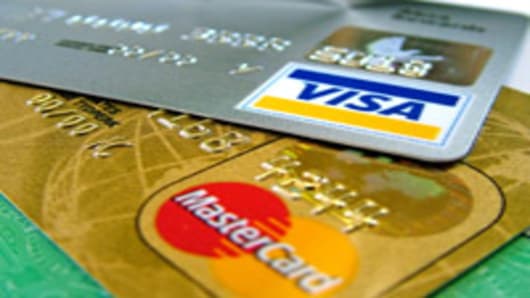In the past month, thousands of credit card customers have been surprised by news that their minimum payments will more than double -- in some cases, creating a credit card payment as big as a mortgage.
Irate consumers gathered on online credit card forums to compare situations after the largest credit card issuer in the country, JP Morgan Chase, notified certain cardholders that their minimum payments will increase from 2 percent of the total balance to 5 percent starting in August. Chase cited new federal credit card legislation passed in May that will force card issuers to change some practices. The law sharply restricts the card issuers' ability to raise rates without cause, but does not bar increases in minimum payments.
"Along with the pressures of the economy, issuers have to figure out how to comply with the new rules, and they're doing some experimenting," says Peter Garuccio, spokesman for the American Bankers Association. "People have gotten very used to the convenience of having credit cards in their wallets, and it's easy to forget that these are loans -- unsecured loans."
On some forums, Chase customers complained of monthly payments set to increase from $300 to $750 or more. "This is a great way to raise people's interest rates by killing them on the monthly payment," wrote one forum participant.
Consumer advocates expressed mixed opinions about the move. The increase will help some cardholders pay off their balances more quickly, consumer advocates say, but the size and timing of the increase will cause problems for consumers who are already struggling. "If you can't make the payment, you're either late or in default," says Linda Sherry, director of national priorities for the non-profit advocacy group Consumer Action.
_____________________________________
More From CreditCards.com:
- Five New Rules in the Balance Transfer Game
- Do Rewards Make People Spend More
- Can One Spouse's Bankruptcy Ruin Another's Credit?
_____________________________________
Chase would not provide many specifics or reveal how the company decided which customers would face the increase. "When making a decision to change terms, we look at the history of the whole account," Chase spokeswoman Stephanie Jacobson stated in an e-mail. "This may include usage on the account, balances and the APRs available on the account, and payment frequency or size. The way customers use and maintain an account helps us determine what changes to make in order to protect our customers and our company."
However, reports from consumers and discussions on online credit forums indicate that many affected customers had, in the past, taken advantage of a Chase offer for a balance transfer with a low interest rate -- typically less than 5 percent -- for the life of the transfer. Many reported that they had been paying on the balance for more than two years and had not made additional purchases that would be subject to higher interest rates.
That was the case for Sande Donahue, a retired paper company manager from Chicago, who manages her finances meticulously and believes Chase wants to renege on the deal it gave her about three years ago for 2.99 percent interest for the life of a balance transfer. Her minimum payment on the card will jump to $488 a month. Donahue has two more cards with Chase, including another low-interest balance transfer, and she's waiting for a second notice. "They're the ones who made this deal, and they should stick to it," Donahue says. "There are a lot of people who wouldn't be able to afford this."
Consumers who are facing an unwanted -- or unaffordable -- increase do have options, experts say. Here are some steps you can take:
1. Try to opt out. Check the letter that notified you of the change in terms or call the card issuer to ask about an opt-out provision that would allow you to stick with your old terms if you close the account. "Some people get overly concerned about their credit score, but, in a case like this, keeping your head above water financially trumps any of those concerns," says Gail Cunningham, spokeswoman for the National Foundation for Credit Counseling. "If your score takes a hit because you closed the account, so be it. As you pay down your debt, your score will automatically improve."
2. Call the creditor. If you don't want to close the account, gather all your records -- your payment history, credit score and any other evidence that you've been a good customer -- and call the issuer. "Remind the creditor how long you've been a customer, your average charging amount and mention if you're in a stable profession with a steady income," Cunningham says. "Paint the picture that you're the perfect customer, then ask for what you want."
3. If phone calls fail, consider writing a letter complaining to the creditor. Shanté Smith -- a recent university graduate in Los Angeles who asked to be identified by her middle name -- managed to keep her card open and go back to her 2 percent minimum payment by complaining in writing to the correspondence department at Chase. "If you feel you're not getting the response you deserve, just keep asking who can help you get the response you want," Smith says.
4. Transfer the balance. If you get nowhere with the issuer, consider opening a balance transfer credit cards (See: "5 new rules for credit card balance transfers") or transferring the balance to another card you already have open. "I don't want people to have a wallet full of credit cards, but it's a good idea to have a backup if something happens to primary card," Cunningham says.


